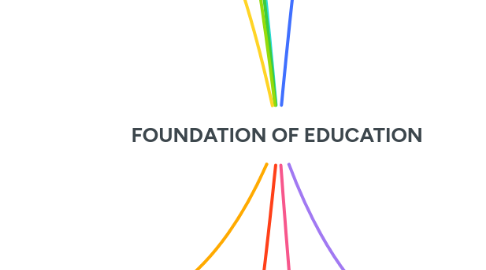
1. Andragogy
1.1. Facilitating
1.2. Helping adults learn
2. Heutagogy
2.1. Self directed learning
3. Differentiated Instruction
3.1. Various Grouping
3.2. Learning Contracts
3.3. Tiered Assignment
3.4. Choice boards
4. Teaching Approaches
4.1. Deductive
4.2. Inductive
4.3. Eclectic
4.4. Mastery
4.5. Thematic
4.6. Integrative
5. Pedagogy
5.1. Teaching
5.2. Teaching Models
5.2.1. Behavioral
5.2.1.1. Student’s behaviour
5.2.2. Personal
5.2.2.1. Student’s ability and interests
5.2.3. Information Processing
5.2.3.1. Student’s cognition
5.2.4. Social
5.2.4.1. Student’s environment
5.3. Teaching Strategies
5.3.1. Expository
5.3.2. Evidence based
5.3.3. Discovery
5.3.4. Inquiry
5.3.5. Discussion
5.4. Teaching Techniques
5.4.1. Lectures
5.4.2. Demonstration
5.4.3. Simulation
5.4.4. Problem solving
5.4.5. Project
5.4.6. Brainstorming
6. Sociology
6.1. Study of human social behaviour
6.1.1. Structural-Functional Approach
6.1.1.1. Social structure
6.1.1.1.1. Social functions
6.1.1.1.2. Social dysfunction
6.1.2. Social-Conflict Approach
6.1.2.1. Gender-conflict theory
6.1.2.1.1. Feminism
6.1.2.2. Race-conflict theory
6.1.3. Symbolic-Interaction Approach
7. Physchogy
7.1. Educational Physchology
7.2. Behavioral View of Learning
7.2.1. Behaviorism
7.2.2. Learning
7.2.3. Stimuli and responses
7.2.3.1. Reinforcement
7.2.3.2. Punishment
7.3. Cognitive View of Learning
7.3.1. Sensory memory
7.3.2. Attention
7.3.3. Perception
7.3.4. Duration
7.3.5. Storing
7.3.6. Encoding
7.3.7. Long term memory
7.4. Constructivist Views of Learning
7.4.1. Individual
7.4.2. Social
7.4.2.1. Reciprocal Determinism
7.4.2.2. Environment
7.4.2.3. Behaviour
7.4.2.4. Personal component
8. Philosophy of Education
8.1. Metaphysics
8.1.1. Reality /existence
8.2. Epistemology
8.2.1. Knowledge
8.2.1.1. Revealed knowledge
8.2.1.2. Intuitive knowledge
8.2.1.3. Empirical knowledge
8.2.1.4. Authoritative knowledge
8.2.1.5. Rational knowledge
8.3. Axiology
8.3.1. Values
8.3.1.1. Ethics
8.3.1.2. Aesthetics
8.4. Logic
8.4.1. Reasoning
8.4.1.1. Deductive logic
8.4.1.2. Inductive logic
8.5. School of thought
8.5.1. Traditional
8.5.1.1. Idealism
8.5.1.1.1. Valuable
8.5.1.2. Realism
8.5.1.2.1. Metaphysics
8.5.1.2.2. Epistemology
8.5.2. Modern
8.5.2.1. Pragmatism
8.5.2.1.1. Metaphysics
8.5.2.1.2. Epistemology
8.5.2.1.3. Axiology
8.5.2.2. Existentialism
8.5.2.2.1. Metaphysics
8.5.2.2.2. Epistemology
8.5.2.2.3. Axiology
8.5.3. Western
8.5.3.1. Essentialism
8.5.3.2. Perennialism
8.5.3.3. Progressivism
8.5.3.4. Reconstructivism
8.5.4. Islamic
9. Classroom Assessment
9.1. Formative
9.1.1. Quizzes
9.1.2. Presentation
9.1.3. Games
9.1.4. Group Activities
9.2. Summative
9.2.1. Tests
9.2.2. Reports
9.2.3. Final exams
9.2.4. End of class projects
